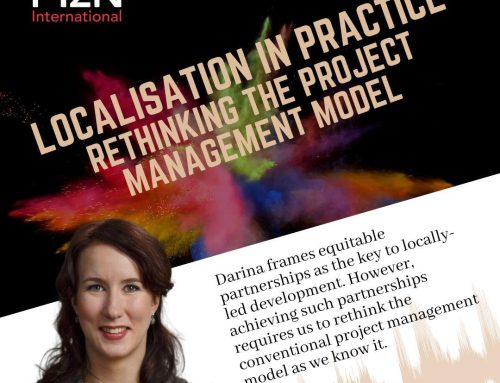Most development and aid experts agree that local action is more effective, efficient and the right thing to do. The days of designing programmes in London, Washington DC and Berlin should be over.
However, having worked on localisation since 2011, I find locally led development principles often fall short in their realization. The key reason for this is that to work efficiently and truly under the principle of locally-led action, INGOs need to make some critical changes in how they operate. This can be painful, yet necessary.
Some hard operational and mindset changes are necessary to make this possible. Here are some of the fundamental organisational changes that are necessary to walk the walk on localisation.

1. Shift from an implementor to an enabling platform
To truly empower local partners, we need to recognise what local CSOs can and cannot yet do. One critical ability that local CSOs sometimes lack is having a track record and system in place to attract and manage international grants. Maintaining these is expensive and cannot be achieved overnight.
This is where INGOs can step in and help. Many agree that INGOs should, whenever possible, avoid direct implementation. However, what often goes unsaid is that these organizations must instead transform into platforms that empower and enable a wide host of local NGOs and CSOs. That includes providing online finance and grant management systems, M&E systems that are easy to use with minimal INGO intervention, as well as a working business development process that puts the local CSO front and centre.
We have built these platforms for INGOs since 2011, and they have become increasingly cheaper and easier to use. What remains hard work, however, is the underlying change needed in the business model of INGOs, which currently often limits localisation.
2. Become an income-generating system that works for local CSOs
One key area where localisation often falls short is in managing finances. INGOs have the track record, experience and systems in place to manage large-scale grants and service contracts from philanthropic and institutional donors. Local and national NGOs often do not.
And because compliance with the onerous rules and regulations of donors is not something that many small organisations can do, localisation led principles fall short of their full potential. In my experience, local fundraising (or “domestic revenue capture”) usually falls short of expectations too.
The key to overcoming this is to build a fundamentally different income-generating system. This can be achieved in several ways: For instance, in one large US-based INGO, we built a simple process where the funding opportunities are regularly shared with the network of partners. The local partners then selected which parts of the programme they could handle and which parts they preferred the INGO to take over. Over three years, implementing a graduation system for management duties resulted in an increase in the share of unrestricted funds for local partners. Interestingly, this also increased the win rate by over 15%.
Whilst all this is possible, it requires more than just inspired leadership and investments. What it requires is a mindset change. We need to redefine what it means to be a successful NGO. NGOs need to shift focus away from budget size, the number of country organizations it establishes, or the multitude of concurrent programs it runs. Instead, the focus needs to shift to the following components:
3. Shifting mindset
1.The quality of partnerships rather than sheer revenue growth
We in the global north need to develop the ability to manage deep-rooted implementation partnerships. To achieve this, we as the northern NGO need a clear design of what we bring to the partnership. A lot of the time, the unique value of an NGO that manages partnerships and implements through deep-rooted partnerships is not the partnership in itself, but, instead, the ability to manage large funds. Using your network in the global North and attracting large amounts of diversified funds, properly accounting for them, reporting back to them, and communicating results back to the donors, investors, and commercial contract holders in the global North is what you bring to the partnership. As Christina Bennett, CEO of Start Network recently said on our podcast Chasing Impact:
“Your success factors need to become about the quality of partnerships, the positive humanitarian outcomes that you’re able to achieve, your ability to enable others rather than your ability to grow how many countries you’re in, your budget, and revenues from donors.”
That ability calls for NGOs committed to local development to become not just fund managers, but much better on the fund management side, as well as the communication side.
2. Outcomes and impact, rather than geographical expansion
Our focus needs to move away from the geographical expansion and more towards the outcomes and impact. What are we expecting from our partners to be done? It is less charity to our partners and more of a well-meaning supplier relationship where the supplier holds the power. We need to change the tone in which we manage partnerships to have an eye-to-eye level, respectful partnership for whoever is in need of aid, rather than managing partner organizations as if they’re in need of aid themselves.
3. Empowering others, instead of expanding our own footprint, visibility, and revenue
To quote Christina Bennett, being truly locally led “does require you to accept the fact that maybe your success factors are more about how you’re enabling others, how you’re able to build up your partners, how you’re able to influence the global policy because you have those networks”, rather than expanding your own revenue.
In concrete terms that means we need to build a business platform upon which a diverse set of partners can operate. Because many of these partners in the global south don’t have the infrastructure to manage income and expenses to hire corruption-free to comply with the transparency request, many donors have to be professional in the procurement procedures.
Is there an online operating platform that a northern NGO can share and provide, not just to manage itself (they’re not particularly good at it) but to provide the local implementation platform for a diverse set of partners to work on?
“It is about turning the Humanitarian supply chain on its head so that you are the service provider, [and] your local partners are the clients. You’re their implementing partner versus the other way around, they pay you for services that you can deliver because you have global reach because you have ah a well-established operation system or a well-established financial system” – Christina Bennett Start Network.
The big challenge organizationally is to transform an INGO into a multifaceted entity that can operate as a fund manager, operating platform, and service center, instead of being limited to just one of the roles. We need to move away from the outdated model of being merely implemented that solely attracts and implements grants. By embracing this new approach, organizations can become more sustainable efficient, and impactful in their operation, and ultimately drive truly locally-led development.




